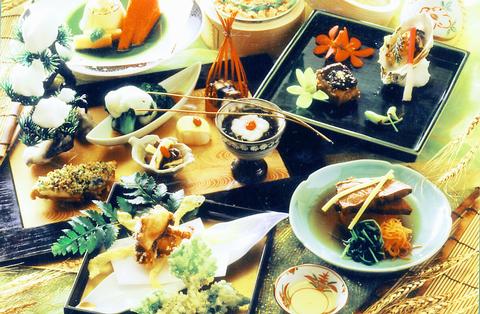One of the most exclusive Japanese restaurants in town, Suntory aims to provide highly personalized service. "With so many good Japanese restaurants in Taipei, we have focused on providing the best service [to distinguish ourselves,]" said Lilian Yeung (
Suntory specializes in kaiseiki cuisine, a style that emerged from Zen practice but developed into a form of super-delicate food art. Portions are small, and you are expected to savor each mouthful. At Suntory, the effort is definitely worthwhile.
While there is an a la carte menu, most diners opt for the range of set menus, which start around NT$900 for a lunch set and going up to around NT$3000. "It is in the set menus that our quality shows," said chef Sakamoto Mitsuhiro. "It gives us the opportunity to present some unusual dishes that you can rarely taste in Taiwan."

PHOTO COURTESY OF SUNTORY
Suntory usually offers around 10 set menus and a number of specials, such as the current promotion of kaiseiki cuisine from the Niigata region, which is particularly famous for the quality of its rice and seafood. An amazingly simple dish, the steamed koshihikari rice (
Soups are often the test of a restaurant, and nothing is simpler than miso -- but Suntory adds queen crab craw, and simple flavorings of spring onion, seaweed and tofu. True to the old-fashioned authenticity that Suntory espouses, the soup is kept warm with a heated stone placed in the stoneware bowl in which it is served. It is these little touches that you pay for at Suntory. "It is in such ways that we are different," Yeung said. "It is the sort of thing you can only expect in a five-star hotel."
Suntory is not a hearty dinner option by any means, and you'll drop quite a lot of cash, but it is probably one of the most authentic Japanese experiences available, which many celebrities from finance, entertainment and politics have endorsed by their patronage.

April 28 to May 4 During the Japanese colonial era, a city’s “first” high school typically served Japanese students, while Taiwanese attended the “second” high school. Only in Taichung was this reversed. That’s because when Taichung First High School opened its doors on May 1, 1915 to serve Taiwanese students who were previously barred from secondary education, it was the only high school in town. Former principal Hideo Azukisawa threatened to quit when the government in 1922 attempted to transfer the “first” designation to a new local high school for Japanese students, leading to this unusual situation. Prior to the Taichung First

The Ministry of Education last month proposed a nationwide ban on mobile devices in schools, aiming to curb concerns over student phone addiction. Under the revised regulation, which will take effect in August, teachers and schools will be required to collect mobile devices — including phones, laptops and wearables devices — for safekeeping during school hours, unless they are being used for educational purposes. For Chang Fong-ching (張鳳琴), the ban will have a positive impact. “It’s a good move,” says the professor in the department of

On April 17, Chinese Nationalist Party (KMT) Chairman Eric Chu (朱立倫) launched a bold campaign to revive and revitalize the KMT base by calling for an impromptu rally at the Taipei prosecutor’s offices to protest recent arrests of KMT recall campaigners over allegations of forgery and fraud involving signatures of dead voters. The protest had no time to apply for permits and was illegal, but that played into the sense of opposition grievance at alleged weaponization of the judiciary by the Democratic Progressive Party (DPP) to “annihilate” the opposition parties. Blamed for faltering recall campaigns and faced with a KMT chair

Article 2 of the Additional Articles of the Constitution of the Republic of China (中華民國憲法增修條文) stipulates that upon a vote of no confidence in the premier, the president can dissolve the legislature within 10 days. If the legislature is dissolved, a new legislative election must be held within 60 days, and the legislators’ terms will then be reckoned from that election. Two weeks ago Taipei Mayor Chiang Wan-an (蔣萬安) of the Chinese Nationalist Party (KMT) proposed that the legislature hold a vote of no confidence in the premier and dare the president to dissolve the legislature. The legislature is currently controlled